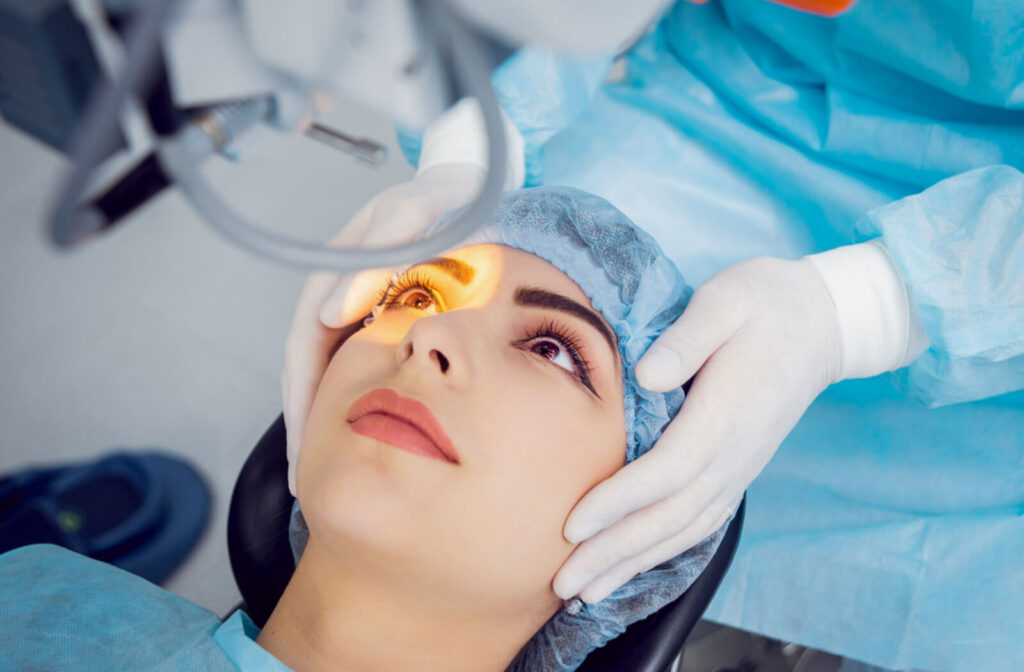Cataract surgery is one of the most common and successful surgeries performed in the US with a typically short and uncomplicated recovery time. But despite these facts, no one wants to go through surgery more than once for the same problem. But if you’ve had cataract surgery and your vision changes, it’s completely understandable that you’re worried you’ll start developing cataracts again.
During cataract surgery, your natural lens is removed and replaced with an intraocular lens (IOL). These lenses are artificial and cannot develop cataracts, which means you can’t develop cataracts again in the same eye. However, other complications can arise that have similar symptoms.
Keep reading to learn what cataracts are and how they affect the eye. We’ll also briefly examine how cataract surgery works and what you can expect afterward.
What Is a Cataract?
The natural lens of your eye is supposed to be clear, but when a cataract develops, this lens gradually grows cloudy.
As a cataract first starts developing, it’s unlikely you’ll notice any symptoms. It’s only when it begins making your vision dim or cloudy that it becomes obvious. This is an excellent example of why it’s so important to get regular eye exams as recommended by your optometrist.
During a comprehensive exam, your optometrist can typically diagnose a cataract long before it affects your vision. This gives them the opportunity to help you slow its development and lessen the need for surgical correction.
It’s also worth noting that cataracts are not necessarily harmful. Outside of them affecting daily activities, many people carry on with life as normal. But if they cause enough vision problems, cataract surgery is the only permanent fix.
Risk Factors for Cataracts
It’s generally accepted that the 2 major causes of cataracts are aging or eye injuries. But several other factors can increase your chances of developing a cataract, including:
- Unmanaged health conditions like diabetes
- Excessive UV exposure
- Smoking
- Obesity
- High blood pressure
- Excessive use of corticosteroid medicine
- Excessive alcohol consumption

Cataract Prevention
There’s no way to guarantee you won’t develop a cataract. But there are certainly some ways to minimize your chances of getting cataracts or having them cause complications in your vision:
- Regular eye exams: This is one of the best things you can do for your eyes. Not only can a eye care doctor diagnose a cataract in its earliest stages, but they can also diagnose and begin managing other eye diseases or conditions.
- Quit smoking: Your entire body will thank you for this one.
- Reduce your alcohol consumption: Also beneficial for your whole body.
- Protect your eyes: Always wear sunglasses when you’re outside or exposed to UV light. This can also reduce your risk of developing glaucoma and eye conditions.
- Healthy, balanced diet: Eating a diet that is low in processed foods and has lots of fruit and veggies is a significant key to good overall health. But regarding the eyes, a healthy diet is especially good for you.
Getting Rid of Cataracts
During the early stages of cataract development, they can often be corrected with eyeglasses or contacts. Many people also find increasing the amount of light helpful for certain activities like reading.
But the only solution is cataract surgery to fix or “cure” a cataract. Using the word surgery in connection with our eyes can sound a bit daunting, but there’s nothing to worry about.
If you’re looking for effective cataracts treatment, The Center For Sight surgeons have been performing cataract surgeries for over 30 years and are committed to excellence. In 2012, our team was the nation’s first to perform laser cataract surgery with a LENSAR femtosecond laser.
Can You Get Cataracts More Than Once?
During cataract surgery, the cloudy natural lens is removed from the eye. The eye surgeon then replaces that lens with an IOL, which can be manufactured with a prescription. This way, they can correct other vision issues besides the cataract.
Because your new lens is synthetic, there is no way that a cataract can develop on it in the future. However, there is something called posterior capsular opacification that can occur. Unfortunately, this side effect can impact your vision in the same way a cataract can.
Secondary cataracts, or posterior capsular opacification (PCO), differ from the original cataract because they do not develop on the natural lens itself. Instead, secondary cataracts are caused by the clouding of the natural lens capsule, which is left in place during surgery to support the IOL. While this complication may feel similar to cataracts growing back, rest assured that it can be treated effectively.
Posterior Capsular Opacification Treatment
This is sometimes known as a secondary cataract because it develops in the eye’s natural lens capsule. Weeks, months, or even years after successful cataract surgery, this capsule could grow cloudy.
Fortunately, treatment for a secondary cataract is common and typically takes only 5 minutes. The ophthalmologist will perform a posterior capsulotomy. They numb your eye and use a special laser to create a small hole in the capsule, which allows light to fill it again for clear vision.
Learn More About Cataract Surgery
Cataracts may be common with aging, but they aren’t normal. If you have a cataract that affects your ability to do your daily activities, give us a call at Center For Sight. The professional staff can answer your questions and book a consultation with one of our eye doctors.
FAQ’s
1. Can you have cataracts again after surgery?
No, you cannot develop a cataract again on the artificial lens (IOL) placed during surgery. However, a secondary cataract or posterior capsular opacification can occur.
2. Do cataracts grow back?
No, cataracts cannot grow back once the natural lens is removed during surgery. Any vision issues after surgery are likely due to secondary cataracts, which are treatable.
3. What are secondary cataracts?
Secondary cataracts, also called posterior capsular opacification, occur when the capsule holding your IOL becomes cloudy. They are different from primary cataracts and can be easily treated.







